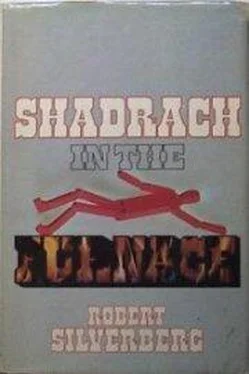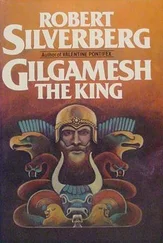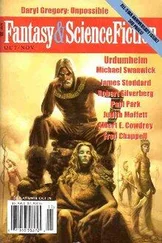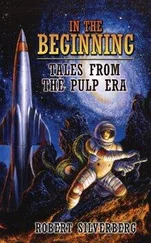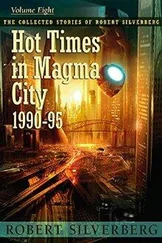She smiles tenderly. “Did you sleep well, Shadrach?” Her strength, and the strength of her concern for him, radiates glowingly from the screen. She is a stalwart woman, an athlete, a huntress, tawny-skinned, big-breasted, nearly 190 centimeters tall, with a strong heavy-boned face, wide-set eyes, wide-lipped mouth, assertive high-bridged nose. Her parents on both sides were Amerindians, Navajo mother, detribalized Assiniboin father. She and Shadrach Mordecai have been lovers for four months, friends for more than a year. Mordecai hopes Genghis Mao knows nothing of their affair, but he suspects it is a naive hope.
He says, “I slept well for a while, anyway.”
“Worrying about the Chairman’s operation?”
“I suppose. Or, maybe just worrying in general.”
“I could have helped you relax,” she says with a sly grin.
“Probably you could. But I’ve always abstained the night before the Chairman undergoes surgery. Like a prizefighter, like an opera singer. To keep the concentration absolutely clear, the mind unblurred. I know it’s silly, Nikki, but it’s something I do.”
“All right. All right. I was only teasing. Anyway, we can make up for it tonight.”
“Tonight, yes. Or this afternoon. We’ll have him off the table by 0230 hours. How would you like to take the tunnel to Karakorum with me?”
Nikki Crowfoot sighs. “Can’t. Don’t tempt me. Critical tests this afternoon. Do you want to hear my report?”
Dr. Crowfoot’s work overlaps, in some respects, both the other projects, for Project Avatar’s goal is to develop a personality-transfer technique that will permit Genghis Mao — his soul, his spirit, his persona, his anima, but no actual physical part of him — to move to another, younger body. Like Project Talos, Avatar strives to reduce the patterns of Genghis Mao’s mental responses to digital — therefore programmable, therefore reproducible — codings; like Project Phoenix, Avatar intends to give the Chairman a new and healthy body in which to dwell. But where Talos would house the digital-coded analogue of Genghis Mao in a mechanical construct. Avatar would use a real body of flesh and blood; and where Phoenix would give the Chairman new vitality by rejuvenating his own body, Avatar would place him in one formerly inhabited by someone else, specifically Mangu. On the one hand Crowfoot’s project would avoid the inhumanity of creating a robot Khan, on the other it would sidestep the problem of brain-cell deterioration by instilling the intangible and abstract essence of Genghis Mao in a young and vigorous brain. Despite the areas of overlap, the three projects conduct their research altogether independently of one another, and no attempts are made at exchanges of ideas. Redundancy, after all, is our main avenue of survival.
Shadrach Mordecai, because he is privy to the work of all three, is perhaps the only one who really knows where they stand in relation to one another. He knows that Katya Lindman’s team is attempting something that is probably hopeless — instilling the soul of a man into a machine will not produce a convincing and politically viable duplicate of the original, machines ordinarily being incapable of transcending their machinehood — and that Irayne Sarafrazi’ s group, though it is pursuing the most plausible route toward giving Genghis Mao the eternal life he hungers for, is destined to be blocked by the apparently insoluble brain-decay difficulty. He knows, too, that Nikki Crowfoot’s approach to personality coding has been more fruitful than Lindman’s, and that in a matter of months it may be possible for the scientists of Project Avatar to infuse the essence of Genghis Mao like a pervasive coating of paint over the mind of a donor body whose previous occupant has been obliterated by electroencephalographic mindpick techniques. Poor Mangu. Poor hopeful tragic princeling, destined to be nothing better than a tabula rasa for the Khan.
Mangu’s fate will not be long delayed. Mordecai listens in chilly fascination to Nikki’s recitation of the latest wonders. They have reached the stage where they can code the souls of animals, abstracting from them the unique electrical patterns of their minds, transforming those waveforms into numbers, using the numbers to replicate the electrical patterns within the brains of donor beasts. They have coded a rooster and pumped its soul into a mindpicked hawk; hawk no longer flies, but runs cock-a-doodling around the chicken coop, clumsily fluttering its magnificent wings and crazily mounting the terrified hens. They have coded a gibbon and housed its mind in a gorilla’s body; gorilla has turned berserkly arboreal, brachiating in wild desperation through the treetops, while its evicted gorilla-essence now resides within a former gibbon that struts ponderously at ground level, leaning on its flexed knuckles and pausing occasionally to pound its scrawny chest. And so on, and so on; they are getting ready to attempt the first human transfers, within a matter of weeks. Mordecai does not ask Crowfoot where she intends to obtain her experimental subjects. There are confusing problems of ethics as it is in this whole business of serving Genghis Mao; he would rather not load his conscience with his beloved’s deeds.
“Call me when the operation’s over,” Nikki Crowfoot tells him.
“Won’t that interrupt your critical tests?”
“Not critically. Call me. I’ll see you tonight.”
“Tonight, yes,” Shadrach says faintly.
The time is 0855 hours. He must convey Genghis Mao now to the Surgery.
The liver, the body’s largest gland, is a useful and complex organ weighing a kilogram and a half — about two percent of the total body weight — that performs hundreds of significant biochemical functions. The liver produces bile, a green liquid essential to digestion. Through the liver passes exhausted venous blood en route to the heart, blood which the liver filters to remove bacteria, poisons, drugs, and other noxious impurities. To the blood the liver adds the plasma proteins it manufactures, among them the clotting agent fibrinogen and the anticoagulant heparin. From the blood the liver takes sugar, which it converts to glycogen and stores until the body’s energy needs require it. The liver is responsible also for the conversion of fats and proteins into carbohydrates, the storage of fat-soluble vitamins, the manufacture of antibodies, the destruction of outworn red blood cells, and much else.
So many metabolic purposes does the liver serve that no vertebrate can survive more than a few hours without one. So central is it to life that it has extraordinary regenerative powers: if three quarters of the liver is removed, the remaining cells will multiply so rapidly that the gland will regain its original dimensions within two months. Even if ninety percent of the liver is destroyed, it continues to produce bile at the normal rate. Redundancy is our main avenue of survival. Nevertheless the liver is subject to many dysfunctions — the various jaundices, the various necroses, septicemia, dysenteric abscesses, cancer of the bile passages, and so forth. The liver’s totipotence enables it to withstand such dysfunctions for prolonged periods, but its powers of recuperation diminish, like most other things, with age.
Genghis Mao suffers from chronic liver trouble. To sustain his life and the life of the assorted artificial and transplanted organs within him, the Chairman must pour oceans of medication through his system each day, and even the most durable of livers would be hard pressed to handle the constant assault of high-powered chemicals it is asked to filter from Genghis Mao’s bloodstream. Then, too, the presence of so many alien organs sets up biochemical interaction phenomena within the body that the liver must counteract, and the strain is telling. The Chairman’s beleaguered liver is in a perpetually morbid state, aggravated by his great age and the unnatural intricacy of his composite internal structure, and periodically it must be replaced. That time has again come.
Читать дальше
